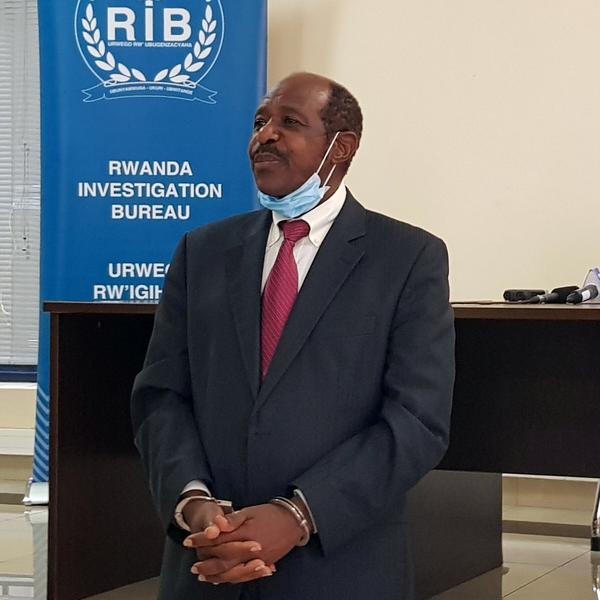
By cuterose
Paul Rusesabagina was called a hero after 'Hotel Rwanda,' now he's accused of terrorism
LONDON -- Paul Rusesabagina thought he was heading to Burundi when he boarded an airplane in the United Arab Emirates on the night of Aug. 27, 2020. But the 66-year-old former hotelier, who inspired the acclaimed 2004 film "Hotel Rwanda," landed behind bars in Rwanda's capital.
Rusesabagina's whereabouts were unknown for several days until Rwandan authorities paraded him in handcuffs during a press conference in Kigali on Aug. 31. Rusesabagina's adopted daughters, Anaise and Carine Kanimba, were together in Washington, D.C., when they got a telephone call from their brother, telling them about their father's arrest.
"It was 6 a.m. in the morning and he said, 'Dad is in Kigali,'" Anaise Kanimba, 29, recalled during an interview with ABC News in Washington. "We didn't believe what he said at first, but then we know he would never joke on something like that. And it was this nightmare that we never thought would ever be true."
Rusesabagina, who is originally from Rwanda but is a Belgian citizen and permanent U.S. resident, has been detained in his home country ever since and is facing a slew of terrorism-related charges that include murder and financing terrorism. If convicted, he could face 25 years to life in prison. He has maintained his innocence.
The case has drawn worldwide attention and alarm, including from Rusesabagina’s family who fear that he is facing a show trial and will die in jail.
"The understanding has always been that these allegations against Paul are linked to his criticism of the regime that's in power in Rwanda," Rusesabagina's lead counsel, Kate Gibson, told ABC News during a remote interview from Geneva.
The 'Hotel Rwanda' story
Rusesabagina was the manager of the Hotel des Mille Collines in Kigali during the Rwandan genocide of 1994, when divisions between the country's two main ethnic groups came to a head. The Rwandan government, controlled by extremist members of the Hutu ethnic majority, launched a systemic campaign with its allied Hutu militias to wipe out the Tutsi ethnic minority, slaughtering more than 800,000 people over the course of 100 days, mostly Tutsis and the moderate Hutus who tried to protect them, according to the United Nations.
Anaise and Carine Kanimba were toddlers when their biological Tutsi parents were among those killed in the bloodshed.
"They were telling people to like come out of their houses, come out to the streets and that they were going to take everyone to a safe place, and my parents believed it," Carine Kanimba, 27, recalled during a telephone interview with ABC News from Brussels. "As soon as they got everyone kind of lined up in the streets, they started shooting."
More than 1,200 people took shelter in the Hotel des Mille Collines during what is often described as the darkest chapter of Rwanda's history. Rusesabagina, who is of both Hutu and Tutsi descent, said he used his job and his connections with the Hutu elite to protect the hotel's guests from massacre. The events were later immortalized in "Hotel Rwanda," with American actor Don Cheadle's portrayal of Rusesabagina garnering an Academy Award nomination for best actor in 2005.
The genocide ended in July 1994 when a rebel group led by a Tutsi major-general named Paul Kagame defeated Rwandan government forces. Kagame, now 63, became Rwanda's de facto leader before officially assuming the role of president in 2000.
Rusesabagina and his wife adopted their newly orphaned nieces, Anaise and Carine Kanimba, before fleeing Rwanda with the girls and their four other children in 1996 to live in exile in Belgium.
From real-life hero to hunted dissident
After the movie's release, Rusesabagina rose to fame and was lauded as a hero. He published an autobiography, "An Ordinary Man," and began giving paid speeches at schools, universities, churches and businesses. He started the Hotel Rwanda Rusesabagina Foundation "to help provide voice to victims of genocide and support peace efforts in Rwanda and throughout the world," according to the nonprofit's website. And he picked up numerous awards along the way, including the U.S. Presidential Medal of Freedom in 2005, the highest civilian honor given by the American president.
Since fleeing his homeland, Rusesabagina also became an outspoken critic of the Rwandan government. In his book, Rusesabagina condemned Kagame's Rwanda as "a nation governed by and for the benefit of a small group of elite Tutsis." He also publicly denounced Kagame as a dictator in various interviews, statements and speeches.

The Rwandan government hit back. Just months after the film's debut, Kagame called Rusesabagina a "manufactured hero."
In 2007, Rwanda’s ambassador to the United Nations accused Rusesabagina of financing armed rebel groups along the country’s border with the Democratic Republic of the Congo. A Rwandan prosecutor repeated the claim in 2010, saying he had evidence that Rusesabagina wired large sums of money to rebel commanders.
Rusesabagina relocated his family to San Antonio, Texas, in 2009, after assassination attempts and several break-ins at their home just outside Brussels.
"Kagame has been after my father since the movie 'Hotel Rwanda' came out. When my father received the Presidential Medal of Freedom, Kagame also increased his attacks on him," Anaise Kanimba told ABC News. "My father had to wear a bulletproof jacket every time he had to give a speech."
In May 2020, Rwanda's National Commission for the Fight against Genocide, an ostensibly independent body, published a report about "what really took place at the Hotel des Mille Collines," featuring dozens of testimonies from genocide survivors who accused Rusesabagina of exaggerating his role in saving the refugees or even profiting from it.
ABC News spoke with some of the survivors who have come out against Rusesabagina. One of them, Wellars "Zozo" Bizumuremyi, said he worked with Rusesabagina as the hotel's concierge.
"Paul says he protected people -- it's a lie," Bizumuremyi told ABC News during an interview in Kigali. "If you didn't have money, he wouldn't let you stay at the hotel."
But American screenwriter Keir Pearson, who co-wrote “Hotel Rwanda” and garnered an Academy Award nomination for best original screenplay, said the dispute over Rusesabagina’s claim to fame is "just a smoke screen."
"Kagame praised the film when it screened in Rwanda in 2005," Pearson told ABC News in an email. "It was only after Paul became critical of Kagame for not implementing long promised democratic reforms that the smear campaign against Paul and the veracity of the film began."
Pearson said he spent about four years researching the Rwandan genocide and what took place at the Hotel des Mille Collines prior to making the movie, interviewing survivors for "countless hours."
"We got Paul's story right," he said.
A 'flawless' trap
Rusesabagina didn't tell his family that he was planning to fly to Burundi from Dubai last August. But one of his daughters, who helped book his flights to and from Dubai, said that wasn't unusual.
"I didn't know much about his plans in Dubai and generally, given how much he travels, we usually don't even get into those details," Carine Kanimba told ABC News. "We're also very careful over what we say over the phone because we know that the [Rwandan] government has been chasing him for so many years. There had been assassination attempts, they had broken into our home, we knew that they had bugged his phone and were tracking him."
When Rusesabagina arrived in the emirate on the evening of Aug. 27, 2020, he contacted his family to let them know that he had landed safely. He then met up with Constantin Niyomwungere, a Burundi-born pastor who Rusesabagina alleged had invited him to speak at churches in Burundi about his experience during the Rwandan genocide. Later that night, the pair hopped on a private jet that Rusesabagina believed would take them to Burundi's capital, Bujumbura, according to Rusesabagina's international legal team.
Rusesabagina didn't know that the pastor was working as an informant for the Rwanda Investigation Bureau and had tricked him into boarding a chartered flight to Kigali.
"Myself, the pilot and cabin crew knew we were coming to Kigali," Niyomwungere told Rwanda's high court in Kigali on March 5. "The only person who didn’t know where we were headed was Paul."
Rwandan prosecutors alleged that Rusesabagina wanted to go to Burundi to coordinate with rebel groups based there and in the neighboring Democratic Republic of the Congo.
Rusesabagina told the court that after arriving in Kigali early on Aug. 28, 2020, he was brought to an unknown location where he remained blindfolded and bound at the hands and feet for three days and was unable to communicate with his family or lawyers. Rusesabagina's attorneys have accused Rwandan authorities of kidnapping him and bringing him to the country illegally.
"Instead of being able to go through these legal routes that the Rwandan government has taken in the past when they wanted to bring someone back into their jurisdiction for a criminal trial, they went out of their way to avoid and circumvent that procedure by kidnaping him," Gibson told ABC News. "To me, that speaks volumes about the credibility and reliability of the evidence that they have against Paul. If they had a real case against him, they would have had him extradited."
The Rwandan government has admitted to paying for the plane that took Rusesabagina to Kigali, but Kagame said there was no wrongdoing because he was "brought here on the basis of what he believed and wanted to do."
"So there was no kidnap. It was actually flawless," Kagame told Rwanda’s public broadcaster during an interview on Sept. 6, 2020.
The United Arab Emirates has denied having any involvement in Rusesabagina’s arrest and said he left Dubai legally.
On March 10, a Rwandan judge determined that Rusesabagina was deceived into coming back to Rwanda but was not kidnapped and thus the charges against him can't be dropped.
Human Rights Watch, a New York-based international human rights watchdog, said Rusesabagina's arrest "amounted to an enforced disappearance, a serious violation of international law" and that "Rwanda has an established track record of using unlawful, cloak-and-dagger methods to target those it perceives to be a threat to the ruling party."
Kagame is credited by some with turning Rwanda into an economic powerhouse for the East Africa region in the years after the devastating genocide. But others claim the reconstruction came at a price, as Rwanda’s strongman leader has been consolidating power for decades and is known for sniffing out his opponents. Some of Kagame’s critics have even died under mysterious circumstances, both in Rwanda and abroad.
'A sham trial'
The charges that Rusesabagina faces stem from his leadership of an exiled opposition coalition called the Rwandan Movement for Democratic Change, known by its French acronym MRCD. In 2018, there were a series of deadly attacks on villages in southern Rwanda, near the country's border with Burundi, and Rwandan authorities inculpated the National Liberation Front, or FLN, which is the armed wing of the MRCD. In a video statement released later that year, Rusesabagina pledged his "unreserved support" for the FLN, declared Kagame's government to be "the enemy of the Rwandan people" and called for "any means possible to bring about change."
In a pretrial hearing on Sept. 25, 2020, Rusesabagina acknowledged that the MRCD had an armed wing but denied his involvement.
"We formed the FLN as an armed wing, not as a terrorist group as the prosecution keeps saying. I do not deny that the FLN committed crimes but my role was diplomacy," he told the court. "The agreement we signed to form MRCD as a political platform included the formation of an armed wing called FLN. But my work was under the political platform and I was in charge of diplomacy."
Belgian investigators, at the request of Rwanda, have previously questioned Rusesabagina about his alleged involvement in rebel groups. In October 2019, Belgian authorities searched Rusesabagina's residence near Brussels after declining to extradite him to Rwanda, according to Eric Van Duyse, spokesperson for the Belgian Federal Prosecutor's Office.
"Rwanda asked for extradition and we refused, as he is a Belgian citizen, and we opened an investigation," Van Duyse told ABC News over the phone. "We cannot share any details on the investigation because it is still ongoing."
Although the file remains open, the investigation is effectively on hold due to Rusesabagina's current status. The Belgian Federal Prosecutor's Office has had no contact with Rwandan authorities since Rusesabagina appeared in Kigali, according to Van Duyse.
"This is something quite new for us in such a case," he said, "because he was not supposed to be in Rwanda."
The U.S. Federal Bureau of Investigation declined to comment on whether its agents had ever summoned Rusesabagina for questioning as well.
Rusesabagina is being tried alongside 20 other defendants who are accused of being FLN organizers and fighters. The proceedings are expected to last several months. Rwandan officials refused to grant ABC News an interview with him from prison.
"Rusesabagina very early on was collaborating with groups that committed genocide here in '94 and that escaped to Congo," Jean-Paul Kimonyo, a former presidential adviser to Kagame, told ABC News during an interview in Kigali. "The evidence against him is overwhelming."
Rusesabagina's family has denounced the proceedings as "a sham trail" in a "kangaroo court."
"If you're a dissident in Rwanda, you can go to jail, you can get imprisoned, you know, you can get killed," Anaise Kanimba told ABC News. "On top of that, my father has a platform that President Kagame doesn't like. You know, my father has been able to tell the world about what happens in Rwanda."
Rusesabagina's legal team and loved ones have also expressed grave concern over the conditions in which he is being held. Rusesabagina, who is a cancer survivor, has been in solitary confinement in a Kigali prison for nearly seven months and has been denied his prescribed medication for a heart disorder, according to Gibson. The United Nation's Nelson Mandela Rules state that keeping someone in solitary confinement for more than 15 consecutive days is torture.
Rusesabagina was initially denied access to any of his chosen counsel and still does not have access to his international lawyers, including Gibson, who has previously represented Rwandan accused before the United Nations' International Criminal Tribunals for Rwanda. Rusesabagina is not given adequate time and resources to prepare for trial, and the privileged documents provided to him by his Rwandan attorneys are routinely confiscated in prison, according to Gibson.
"In any other jurisdiction, any one of those violations would lead to the trial being permanently staid and the accused being released," Gibson told ABC News. "And here in Paul's case, we just have a litany of violations that are open that we can see that no one is trying to hide. And the culmination of all those violations together should make it clear to the international community that a fair trial in Paul's case in Rwanda is no longer possible."
Both Rusesabagina's family and lawyers have said they fear his fate is already sealed and that his only hope is for the international community to intervene.
The U.S. Department of State "has engaged the government of Rwanda at the highest levels" and "will continue to do as the proceedings run apace," according to spokesperson Ned Price, who told reporters that Rusesabagina's trial must be "fair and transparent." In an open letter to Kagame in February, 37 members of Congress called for Rusesabagina's release and return to the United States "on humanitarian grounds." Meanwhile, the European Parliament adopted a resolution calling for an international investigation into Rusesabagina's case and for Rwandan authorities to allow him a fair trial.
"I can already tell you he will be convicted. We've known that he will be convicted since the first day he arrived there," Anaise Kanimba told ABC News. "Are you going to allow my father to die in jail? Because I think that's really the fear."
ABC News' Malka Abramoff, Bruno Roeber and Maggie Rulli contributed to this report.









